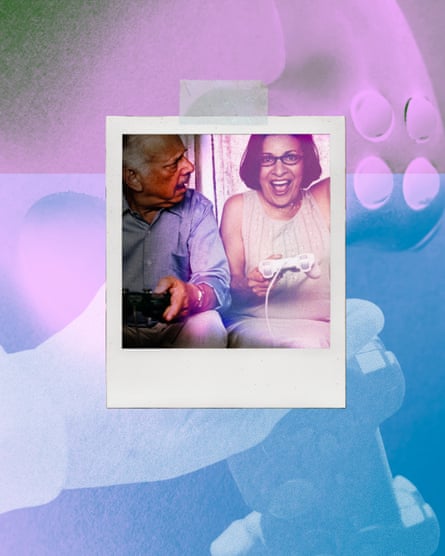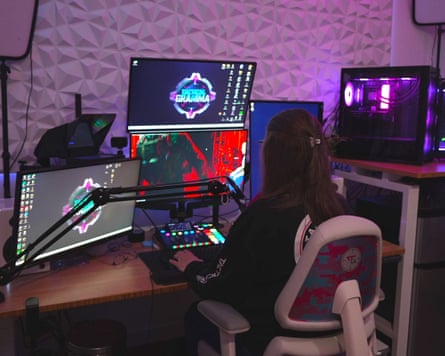
Michelle Statham’s preferred game is Call of Duty. It’s fast and frenetic, involving military and espionage campaigns inspired by real history. She typically spends six hours a day livestreaming to Twitch, chatting to her more than 110,000 followers from her home in Washington state. She boasts about how she’ll beat opponents, and says “bless your heart” while hurtling over rooftops to avoid clusterstrikes of enemy fire. When she’s hit, she “respawns” – or comes back to life at a checkpoint – and jumps right back into the fray.
The military shooter game has a predominantly young male user base, but Statham’s Twitch handle is TacticalGramma – a nod to the 60-year-old’s two grandkids. Her lifelong gaming hobby has become an income stream (she prefers to keep her earnings private, but says she has raised “thousands” for charity), as well as a way to have fun, stay sharp and connect socially.
“A lot of people are surprised that someone my age is playing video games,” Statham admits. She finds the gameplay exhilarating. “When I get really good long sniper shots in, or down someone out of a helicopter, that’s pretty fun,” she says.
Statham juggles in-game multitasking with live-chatting to her multigenerational streaming audience. Younger followers have taught her slang, like the gen Z shibboleth “skibidi”. “I’ve learned some things I don’t want to learn,” she says, laughing. When she tires, she plays privately off-stream to unwind. She also exercises daily, going to the gym with her daughter as part of the 75 Hard fitness challenge, to ensure gaming doesn’t displace physical activity.
Statham is one of the 57 million Americans over 50 who game, a cohort that represents 28% of roughly 205 million total US gamers, shows recent data from the Entertainment Software Association. According to the ESA, nearly half of Americans in their 60s and 70s play some form of PC, mobile or console video game every week, as do 36% of people in their 80s. And as more gamers like Statham enter their golden years, older adults are becoming more visible in the gamer mainstream – sometimes to the confusion of their peers on multiplayer platforms.
Allow Instagram content?
This article includes content provided by Instagram. We ask for your permission before anything is loaded, as they may be using cookies and other technologies. To view this content, click 'Allow and continue'.
“Age is like having a sign around your neck saying: ‘I’m old and I can’t do this,’” says Will, 72, a Missouri-based retired navy veteran who prefers to keep his last name private, but streams his favorite games, like hunting simulator theHunter: Call of the Wild and air combat game Metalstorm, to 1.4 million YouTube subscribers under the username GrndpaGaming.
“That’s not the case with me and other up-and-coming older gamers that are out there,” says Will. “Someone my age can keep up with technology.”
Some research suggests older adults may experience benefits from gaming, though effects depend on the type of game.
There are games created to help boost memory and attention, such as those by the science-based company BrainHQ, which developed a game called Double Decision often used by researchers to test and improve people’s visual processing, and the Lumosity mobile gaming app, which features a popular brain training game called Train of Thought.

More generally, puzzle games like Tetris and Monument Valley, which require players to remember patterns, sequences and spatial layouts, have been shown to help players of any age improve visual memory and cognitive processing. Fitness games that incorporate physical movement, like Ring Fit Adventure or Hot Squat, may improve balance better than conventional rehabilitation in MS patients.
But what about first-person shooter games?
Dr Gregory West, an associate professor in psychology at the University of Montreal, ran a study on participants of all ages in 2018. He found those tasked with hours of playing first-person shooters like Call of Duty experienced a reduction in grey matter in the hippocampal region of the brain. Those who played games involving the exploration of 3D open worlds, like Super Mario 64 or The Legend of Zelda: Breath of the Wild, showed improvement in the same area.
“A reduced volume in the hippocampus is associated with a risk for neuropsychiatric illness across the lifespan,” explains West. “During ageing, older adults with less activity and grey matter in the hippocampus are at increased risk of developing Alzheimer’s disease.”
But that doesn’t mean older gamers should necessarily stop playing first-person shooters. “It really is a mixed bag when we consider the impact of these games on the ageing brain,” admits West.
Allow Instagram content?
This article includes content provided by Instagram. We ask for your permission before anything is loaded, as they may be using cookies and other technologies. To view this content, click 'Allow and continue'.
For one, West’s study didn’t focus on how gaming affects older brains specifically, and he notes that older folks who are successful competitive gamers likely have “pretty good cognitive abilities” to begin with.
Then, there are also social benefits that come with gaming on multiplayer platforms, where first-person shooters are popular. “Older adults, through playing video games online with other people and communicating through microphones, are receiving real social stimulation, and I think that positive benefit cannot be ignored even in the face of a possible risk for Alzheimer’s disease,” he says.
“As long as you keep your brain active and functioning, you’re not going to sit there and just deteriorate away,” says Will.
Even amid percussive gunfire, the chats of combat games can be genuinely sweet. “People always say: ‘I love you, Gramps. Keep on doing what you’re doing’... things like that, that really tug at your heart,” says Will.
Gaming can help people with a variety of ailments, says Dr Kris Alexander, a leading authority in video game design and associate professor of media production at Toronto Metropolitan University who helped launch GameRx, an online resource hub for information about wellness and gaming. One 2017 study found that “if you play Tetris within 48 hours of a traumatic experience, you can reduce PTSD”, he tells me. “There are studies that show that if you place burn victims in virtual reality in spaces where they’re surrounded by cold elements, you can reduce their pain.”
Alexander believes gaming can be good for seniors; over a video call, he shows me the custom arcade cabinet he’s built to house every game he’s ever owned. “For my retirement,” he tells me. “Absolutely, when I get older, I’m going to be playing video games.”
However, common conditions like joint pain and vision decline can hinder senior gamers. As that demographic grows, so may demand for accessibility tools. And because the senior player base is relatively small, Alexander acknowledges that the high-budget gaming companies behind blockbuster titles like Call of Duty and Skyrim are unlikely to account for such needs.
In 2010, Will required surgery implanting a steel plate in his skull; since then, if he sits in a chair “for more than 20 or 30 minutes, everything from the shoulders down to the fingertips goes numb”, he says. Now, he uses a hand-shaped gaming keypad called the Azeron Cyborg II, which allows users with limited hand mobility or strength to position PC keys so they’re easy and comfortable to reach. Other adaptive controllers, including voice-control technology, pedals designed for control by foot or mouth, and 3D printable controller modifications for consoles like the Xbox and Playstation, are all making gaming increasingly accessible across playing formats.
Will hopes that other seniors who see him stream will be inspired to get into gaming. “If I can do it at my age with this handicap, you can, too,” he says. After all, you’re never too old to respawn.

 3 hours ago
4
3 hours ago
4
















































